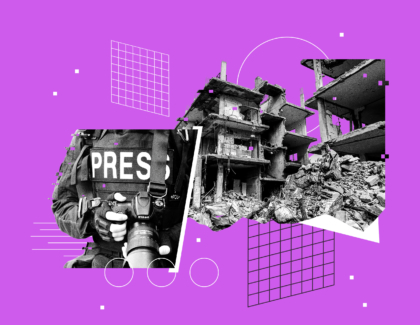Sign up for the daily CJR newsletter.
Watching the upheaval in her home region from a Tunis newsroom in late December, Assabah reporter Rim Saoudi became frustrated. “They wouldn’t let us write about them,” said Saoudi, thirty, referring to the central Tunisian protests labeled “disturbances” by the government. “When I offered to go, [the editors] sent a reporter they knew would whitewash it instead.”
That was then.
Since those disturbances overthrew President Zine el Abidine Ben Ali on January 14, every aspect of Tunisian civic life, including the media, has changed. There is euphoria among journalists savoring a free press for the first time in twenty-three years. Still, say many, it will take time before those journalists can shake off the past.
“Reporters need to learn how to adapt to this new freedom,” says Noureddine Achour, editor of Arabic-language daily Assabah, one of Tunisia’s biggest newspapers. “There is a lot to do.”
For decades, the regime spoon-fed content to reporters who had to mind the “red line.” Theoretically, says Saoudi, that meant only staying away from criticizing “The Family”—the presidential family and their relatives. In practice, it meant only arts and sports stories were safe.
Reporters who crossed this line were threatened, followed, secretly recorded, even imprisoned. Outlets not toeing the line had problems with printers and advertisers afraid of The Family and the state security apparatus.
On January 14, everything changed. At Assabah, top management was thrown out—its owner of two years, Ben Ali’s son-in-law Sakher el Materi, fled to Dubai. The sixty-year-old paper reverted to public ownership and Achour, who had edited a more independent Assabah before Materi removed him two years ago, was reinstated.
While the interim government is still deciding what to do with media outlets once owned by The Family, it has dissolved the Ministry of Information that oversaw and censored the press. And the National Union of Tunisian Journalists has independent leadership again; its board was replaced by pro-government leadership two years ago for being too critical of the media, said Neji Bghouri, its now reinstated leader.
Bghouri, briefly jailed for similar criticism in 2005, says there need to be safeguards to guarantee press freedom, a reform of the press law, and a code of standards and ethics for the press. Shortly after the change in power, the union asked the interim government to create an independent commission for the press to handle accreditation, broadcast licensing, and other regulatory issues. In late February, it got its wish.
But Bghouri’s optimism is cautious. “There is more press freedom now but we worry that it can go backward under another government.” Reporters too have work to do, he says. “Journalists need to learn to report and write critically now.”
Whatever government forms will also require reeducation. “The dictator fell, but the system is still in place,” says Saoudi. “It’s hard to get any kind of statistics, for example. The people who work in the ministries and other institutions have the same habits—it will take time before things improve.”
At Assabah, though, the changes are already obvious. There are few traces of the former owner, except the soccer field and tennis courts he installed outside of the building. The paper is full of articles about strikes and the interim government instead of soccer matches and openings attended by First Lady Leila Trabelsi. In the newsroom, reporters chat animatedly about their work. Saoudi, returning from protests near the main government offices, tells a colleague about them before sitting down to write. She won’t call them “disturbances” now. She doesn’t have to.
Has America ever needed a media defender more than now? Help us by joining CJR today.






